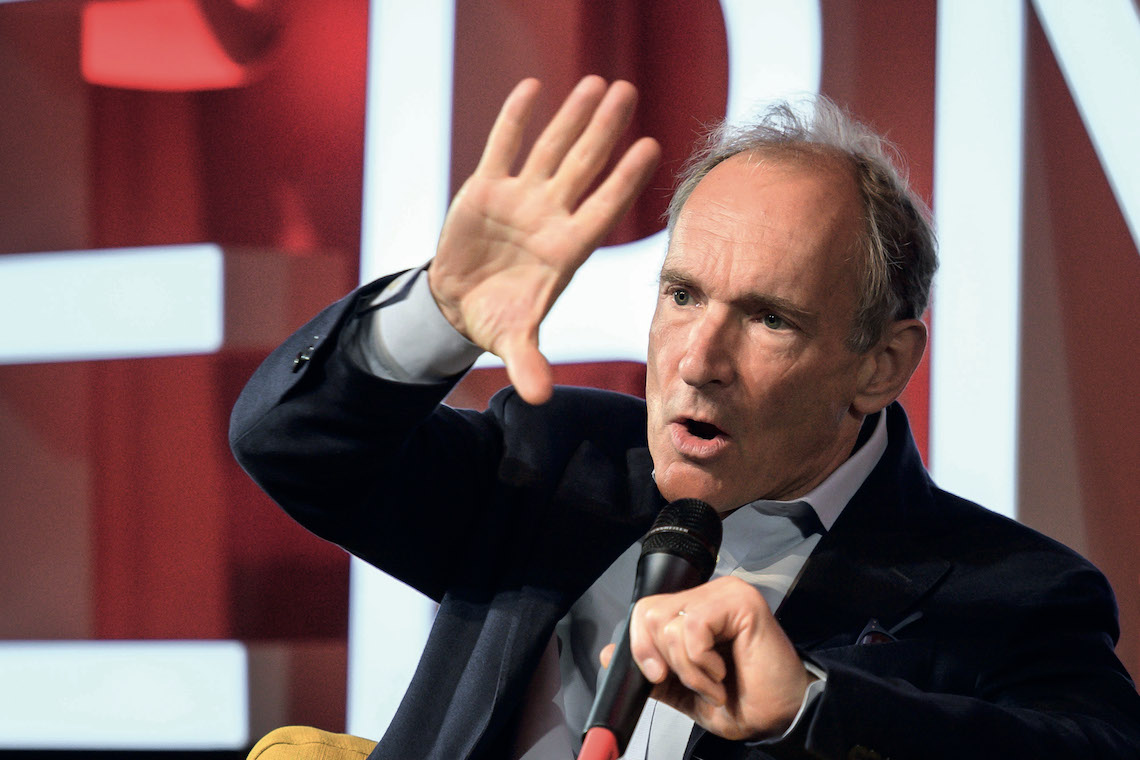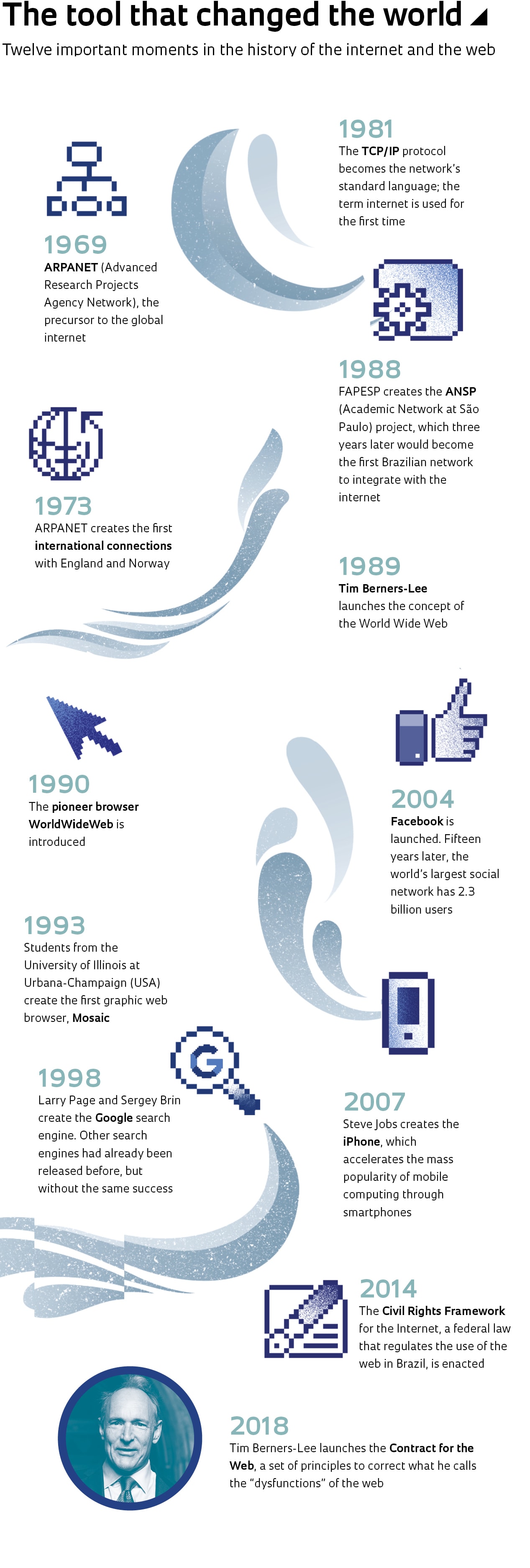The web is all grown up. In March of this year, the World Wide Web (WWW), or as it’s known more simply, “the web,” ended its first three decades. Its invention changed the face of the internet, bringing it to the masses, and brought about profound transformations in the ways people relate to each other and business is conducted. The idea sprang from the mind of British physicist Tim Berners-Lee when he was 33 years old and a researcher at the European Council for Nuclear Research (CERN) in Switzerland. At that time the internet—a network of connected computers located in different places—had been in operation for two decades, albeit in a very different manner. Its limited resources were mainly used for exchanging information between academic researchers. There were no websites, social networks, or search engines.
“The World Wide Web allowed easy interconnection of distributed data around the globe, and became a fundamental component of the modern internet,” says computer scientist Fabio Kon, a professor at the Institute of Mathematics and Statistics of the University of São Paulo (IME-USP), and editor in chief of the Journal of Internet Services and Applications. Kon believes the tool Berners-Lee designed was decisive in popularizing the internet, which today has 4.4 billion users, almost 60% of the global population. “The network has brought us a world of good things and now we can hardly live without the convenience it provides us,” he states. “But on the other hand, it does amplify some of the negative and undesirable phenomena that already existed in society.”
The idea that originated the web, says computer scientist Roberto Marcondes César Júnior, from the Data Science group of IME-USP, has an interesting genesis that reveals the importance of basic research in the consolidation of large scientific projects. “Upon reading Berners-Lee’s suggestion for the creation of a research data-sharing system, his immediate superior at CERN, Mike Sendal, remarked on the document that the proposal was “vague but exciting,” says Marcondes. “In his view the idea still lacked clarity, and it took a few more years of research in the laboratory for the World Wide Web to materialize and become the tool that would revolutionize the world.”
Another aspect the researcher points out is the importance of the web in the advancement of research in artificial intelligence (AI). “Some of the existing AI algorithms are rooted in studies that started many years ago. The creation of the World Wide Web made a lot of information available on the internet, allowing the algorithms to work on a much higher data scale, a process that was essential for their refinement. Without Berners-Lee’s invention, we might have been much further behind with the AI revolution,” Marcondes adds.
During the commemoration of the web’s 30-year anniversary, Berners-Lee expressed concern about certain directions the internet is taking and called for the establishment of a new ethical framework to deal with the problems it’s giving rise to. In an interview with the BBC, he expressed the fear that it is heading towards a dysfunctional future. He believes the scandal involving the British consulting firm Cambridge Analytica, which was accused of using 87 million Facebook users’ private data for political purposes during the 2016 US presidential campaign, revealed just how fragile user privacy is on the World Wide Web.
In an open letter dated March 12, the day of the anniversary, Berners-Lee listed three specific areas of dysfunction that are damaging to the web: malicious intentions such as hacking and online harassment; dubious design, including business models that reward clicks; and the unintended negative consequences of the web, with an emphasis on aggressive and polarizing discourse. To combat these distortions, the British physicist launched the “Contract for the Web” initiative, a set of principles aimed at strengthening the freedom and openness of the internet.
Contract for the Web The principles that all must follow to put the internet back on the right track
GOVERNMENTS
Ensure that everyone can connect to the internet and actively participate online
Keep all of the internet available, all the time, with full access for users
Respect people’s fundamental right to privacy
COMPANIES
Make the internet affordable and accessible to everyone, ensuring that no one is excluded
Respect consumers’ privacy and personal data
Develop technologies that support the best in humanity
CITIZENS
Be creators and collaborators on the web so its content is rich and relevant
Build communities that respect civil discourse and human dignity
Fight for the web so that it remains an open and global public resource for people everywhere, now and in the future
SOURCE CONTRACTFORTHEWEB.ORG
Net neutrality
“We need a new contract for the web, with clear, strict responsibilities so that those in positions of authority can act more effectively,” Berners-Lee said during the latest Web Summit, the largest European internet technology conference, which took place in London at the end of 2018. “Some regulatory issues have to involve governments. Others clearly include businesses. If you are an access provider, you must commit to delivering network neutrality. If you’re a social networking company, you need to guarantee people have control over their data.”
The net neutrality Berners-Lee stipulates is the principle that internet traffic should be treated equally, without discrimination, restraint, or interference, regardless of the source, recipient, type, or content, according to the Global Net Neutrality Coalition, which brings together activists from several countries. This is to ensure that web users’ freedom is not limited by preferential treatment for, or bias against, any internet traffic associated with any particular content, services, applications, or devices.
“Since its origin, the internet was designed to be pluralistic and openly accessible, that is, people connected to it would have access to every kind of content that interests them, regardless of filters and traffic control of data packets,” says lawyer Cíntia Rosa Pereira de Lima, from the USP Law School at Ribeirão Preto and leader of the research group Observatory of the Civil Rights Framework for the Internet in Brazil. Thanks to net neutrality, for example, an internet service provider can’t reduce the access speed of a particular site nor charge for the user to enjoy a certain service on the internet, such as streaming Netflix content.
The researcher is also concerned with pointing out certain problems arising from changes the internet has engendered, especially in interpersonal relationships, business models, and what she calls the monetization of personal data. “As a student of the subject, I’ve observed that with the proliferation of social networks on a global scale, such as Facebook and relationship sites, people have become more concerned about the quantity of relationships, while disregarding their quality,” she notes. In the field of commercial relations, she observes that the internet and the web have substantially altered methods for contracting products and services, methods which have become increasingly abstract and automated.

Tim Berners-Lee: concerned about internet dysfunctionality
“Purchase and sale contracts in e-commerce are often harmful to the consumer. They are purposefully designed to discourage being read by the internet user, who most often closes the deal without knowing that the contract contains unfair terms or waiver-of-rights clauses,” she points out. Finally, when it comes to the monetization of user data, in Lima’s assessment these data have come to be treated as a commodity. “Personal data have become valuable information for direct marketing, and are often used indiscriminately by companies whose sole aim is to make a profit.”
Luca Belli, a specialist in digital law and a professor of internet governance and regulation at the Getulio Vargas Foundation Law School (FGV) in Rio de Janeiro, agrees with the analysis that the internet needs to be brought back on track. “It was conceived as a transparent, decentralized, and distributed network, but in the last four or five years we’re seeing a phenomenon of high concentration, with a few platforms such as Facebook, Google, and Twitter attracting the attention of the majority of users. This is bad, because such a small number of corporations accumulated a lot of power and have gained access to a large amount of data from internet users,” he says.
Glossary A lot of people confuse the internet with the web, but they are different
Internet
The network of computers around the world interconnected by the TCP/IP protocol, created by Americans Vint Cerf and Robert Kahn in the early 1970s
World Wide Web
One of the tools to access the internet. The web, (or WWW), uses the HTTP protocol to transfer information and depends on browser software to function
HTTP
Hypertext Transfer Protocol (information displayed in a digital format, which may contain data in image format, or audio, video, etc.). Conceived by Tim Berners-Lee in the early 1990s, it works in conjunction with the TCP/IP protocol
Belli warns of one element associated with the phenomenon of concentration, which is a certain opacity regarding how these private, closed organizations function. The two factors of concentration and opacity facilitate the manipulation of users, for example, through the dissemination of fake news. “There is a direct relationship between disinformation and platform concentration. It’s much easier to spread rumors on four or five dominant apps that aggregate the majority of social network users than it is to spread them on a large number of medium- or small-sized platforms.”
Belli believes that to reverse this scenario and return the internet to a more open and competitive environment it will be necessary to adopt measures that ensure portability, interoperability, and data security. Portability is the internet user’s right to take their contacts, photos, messages, and anything else from one social network to another, while interoperability means establishing standards that allow the export and import of data between platforms.
Portability is already provided for in the General Personal Data Protection Law, the legal framework for Brazilian internet privacy approved in 2018, which will go into effect next year. But defining the technical standards for its implementation depends on the creation of a national data protection authority, which hasn’t actually occurred yet—although it was instituted by a provisional government measure earlier in the year, it is not currently in operation. “Until this authority starts working, it’s impossible to do data portability,” Belli says. Belli believes it’s also critical to implement a solid cybersecurity framework that precisely defines unlawful behavior, in order to combat hacking and prevent data breaches.
Civilization process
Electrical engineer Demi Getschko is one of the pioneers of the Brazilian internet and president of the Brazilian Network Information Center (NIC.br), the agency responsible for coordinating the registration of domain names on the Brazilian internet. He concedes that the web faces problems, but argues that what is seen there—as has been stated by American mathematician Vint Cerf, one of the internet’s founders—is simply a representation of what exists in the real world. “The internet is a mirror of society. Attacking the internet, breaking the mirror, gets us nowhere. Reality will continue to exist,” he observes.
The popularization of the internet, in Getschko’s view, allowed things to surface that hadn’t been seen before. “Most of the people involved with it are good, but there is an exuberance, an eagerness to participate in the process and speak without thinking, which in time, we hope, will settle down,” he says. “I’m not very supportive of excess legislation. I have doubts about the value and efficiency of regulations for correcting excesses on the internet. As it has no borders, any local legislation tends to fail. And there will always be someone who behaves outside the rules.”
For the NIC.br president, who was directly involved with the arrival of the internet in Brazil in the late 1980s (see Pesquisa FAPESP issue nos. 180 and 221), the way to correct deviations is through a process of socialization and education. “We need to raise users’ awareness and maturity. It’s great that everyone is speaking—in the past, very few spoke up and people only listened every now and then.” Today everyone speaks up, Getschko notes, because the web and the internet have allowed them to. “Naturally, this creates a certain amount of noise. But I prefer hearing the cacophony to the silence,” the scientist adds. “I’m optimistic about the future of the internet.”
Projects
1. An integrated science and technology data system for the state of São Paulo and ANSP (Academic Network of São Paulo) (nº 94/03675-6); Grant Mechanism Regular Research Grant; Principal Investigator Nelson de Jesus Parada; Investment R$7,889,773.58.
2. The interconnection of educational, research, and development institutions in the state of São Paulo with the ANSP network: a study of the feasibility and possible data communication systems to be used (nº 94/03598-1); Grant Mechanism Regular Research Grant; Principal Investigator Nelson de Jesus Parada; Investment R$49,780.00.
Republish



